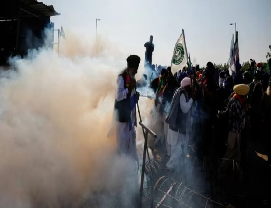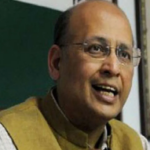Farmers protesting against government policies were met with tear gas by the police at the Shambhu border, which is located between Haryana and Punjab. The farmers were gathered at the border to voice their concerns over issues like farm laws, fair prices for crops, and other demands related to agriculture.
The situation became tense as the farmers refused to move from the border and continued with their protest. To control the crowd and prevent any further violence, the police were forced to use tear gas. This caused chaos, with many farmers running to escape the smoke and stinging effects of the gas.
Farmer leader Sarwan Singh Pandher, who was also stopped at the border, demanded that the farmers be allowed to continue their march to Delhi peacefully or that the government should start discussions about their demands. He said, “We should be allowed to go towards Delhi peacefully or we should be talked to about our demands. The doors for talks are open from our side. We want the government to accept our demands, restore internet services in Ambala, and allow us a place to protest in Delhi.”
Pandher also said that if the government was willing to talk, they should provide a letter from the central government or the Haryana or Punjab Chief Minister’s offices confirming that the discussions could take place.
The farmers have been protesting for a long time, demanding changes in government policies that they believe hurt their livelihoods. Their main concern is that the policies are not helping small farmers and may lead to lower earnings. Many farmers feel that the government is not listening to their problems and are organizing protests across the region to raise awareness.
Authorities said they used tear gas as a last resort to maintain peace and safety. Despite the police action, the farmers remain determined to continue their protests, and the situation at the Shambhu border is still tense.
The government has promised to look into the farmers’ concerns, but so far, no major changes have been made. The protests are expected to continue until the farmers feel that their voices are heard and their demands are addressed.



